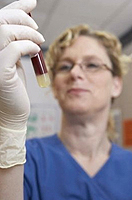In its properties, chlamydia occupy an intermediate position between viruses and bacteria. Therefore, so far chlamydia is diagnosed and treated with great difficulty than ordinary bacterial infections.
Content

Urogenital chlamydia
belongs to sexually transmitted diseases. Often a combination is often noted
Chlamydia with other urinary infections - trichomoniasis, gardnerellosis,
Ureaplasmosis.
How chlamydia is manifested
Incubation period
When chlamydia is about 1-3 weeks. Sick chlamydia notices
Characteristic vitreous discharge from the urethra in the morning. Maybe
Itching itching or unpleasant feeling when urination, sticking of sponges
Outdoor urethra hole.
Sometimes suffers general condition - notes
Weakness, body temperature slightly increases. It should be noted that
chlamydia often proceeds without pronounced signs or at all
manifest.
Even without treatment after a while (about 2 weeks)
Symptoms of the disease disappear. Chlamydia at the same time acquires chronic
The course, chlamydial infection «Canning» in the body waiting for
case to recall again.
What complications can cause chlamydia
The main danger of chlamydia is precisely in those
complications that he can cause. After some time chlamydia «Get» to prostate gland and seed bubbles, causing chronic
Prostatitis and Vesikulit. Next, the chronic process extends to the appendage
Eggs, which can lead to the obtaceous form of male infertility.
Chlamydia
Also can get on the wall of the bladder and cause hemorrhagic cystitis.
Chronic inflammation of the urethra caused by chlamydia,
leads to the development of its narrowing (stricture).
In women chlamydial
Infection often causes the obstruction of phallopy pipes, ectoped
Pregnancy, postpartum or post-element endometritis. Pregnancy in the patient
Chlamydia often proceeds with complications.
In addition to various complications,
relating to genital organs, chlamydia can cause the defeat of other organs.
Then this disease will already be called a disease, or Reiter syndrome. At
Reiter syndrome may be affected by eyes (chlamydial conjunctivitis), joints (more often
ankle, knee and spine), leather, internal organs (more often hepatitis, but almost any organs may be affected).
Diagnosis of chlamydiosis
Diagnosis of chlamydia is more complex than bacterial
infection. The simplest methods have accuracy not more than  40%.
40%.
The most accurate I
Available method for determining chlamydia in the submarine from the urethra to today
The day is the immunofluorescence reaction (reef) using antibodies,
labeled special substance - Fitz.
Treatment of chlamydiosis
By virtue of
characteristics of chlamydia, antibacterial drugs against them are not so effective,
as against ordinary bacteria, so treatment of chlamydia is more complex and
laborious.
In addition to the course of antibacterial therapy, it necessarily includes
Immunomodulatory therapy, polyvitaminotherapy, lifestyle normalization,
diet, rejection of sexual life during treatment.
The treatment must necessarily
To carry out all partners. At the end of the course are conducted test analyzes.
If chlamydia is not detected, then analyzes are held 2 times after 1 month
(in women - before menstruation). Only after that you can talk about
The effectiveness of the therapy.
Prevention of chlamydia
About chlamydia with confidence it can be said that it is much easier to avoid,
than cure. Therefore, once again we give the rules of hygiene of sexual life, which
protect you from various venereal diseases:
-
Permanent partner you trust.
-
Refusal of random sexual bonds or use of a condom. but
Remember that the condom is an effective, but not 100% means of protection against
Venericual infections. -
For the slightest suspicions of infection, refer to the urologist.









